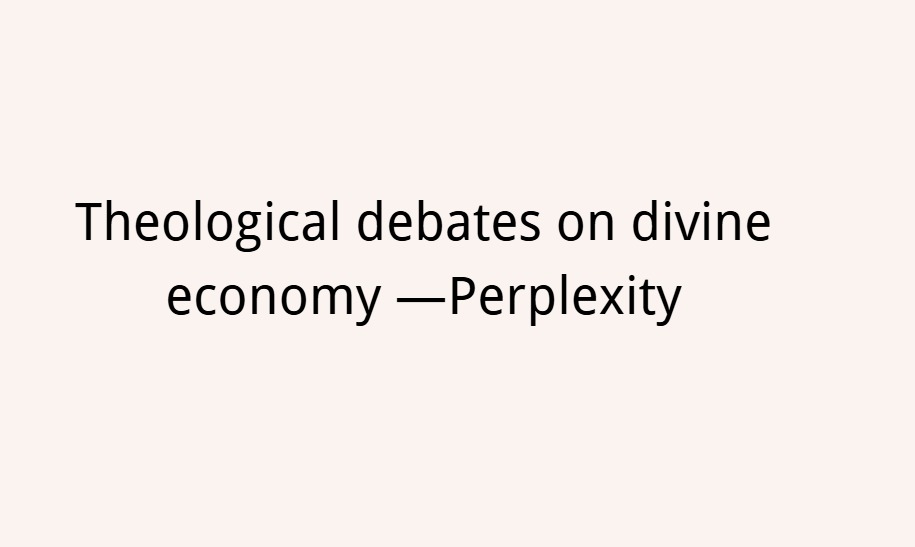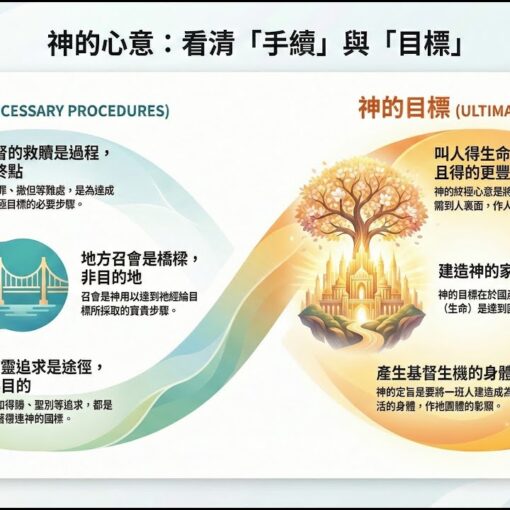have spanned centuries, centering on fundamental questions about God’s relationship to creation, salvation, and the nature of divine action in history. These debates reflect deeper tensions within Christian theology about how to understand God’s eternal plan and its temporal unfolding.
## Early Christological Controversies
The earliest significant debates emerged during the **Patristic period** (2nd-5th centuries) as church fathers developed systematic theologies of the divine economy. Key controversies included:
**Subordinationist Debates**: Early theologians like Athanasius used divine economy concepts to defend **Trinitarian orthodoxy** against subordinationist heresies. The challenge was explaining how the Father, Son, and Holy Spirit could have distinct roles in salvation history (*oikonomia*) while maintaining essential unity. Critics of subordinationism argued that assigning different “economic” functions to the Trinity risked implying ontological inequality[1].
**Christological Formulations**: The Council of Chalcedon (451 AD) employed divine economy language to resolve debates about Christ’s dual natures. The controversial question was how the “economy of salvation” could accommodate both divine and human natures in Christ without compromising either. This sparked ongoing debates about whether the divine economy required genuine divine change or suffering[1].
## The Sabellian Controversy
**Basil of Caesarea** vigorously opposed Apollinarius and Sabellian interpretations that confused the “doctrine of the incarnation” and made “the economy of salvation” doubtful through “dark and cloudy speculations.” The debate centered on whether speaking of divine economy necessarily implied that Father, Son, and Spirit were merely different modes of the same divine person rather than distinct persons in genuine communion[1].
## Medieval and Reformation Developments
**Western Theological Tensions**: The concept of divine economy became entangled with debates about **predestination, election, and free will**. Calvin and Luther incorporated *oikonomia* into their theological systems but disagreed on its implications for human agency and divine sovereignty. These debates intensified questions about whether divine economy was compatible with genuine human freedom or whether it implied theological determinism[2].
**Eastern-Western Divergences**: Orthodox theologians maintained that divine economy (*oikonomia*) also encompassed **pastoral flexibility** in church discipline, allowing adaptation of canon law for salvation purposes. Western theologians were more restrictive, leading to ecclesiastical debates about the proper scope of economic principles[1].
## Contemporary Theological Disputes
**Economic Trinity vs. Immanent Trinity**: Modern theologians debate whether the “economic Trinity” (God’s revealed activity in salvation history) corresponds directly to the “immanent Trinity” (God’s eternal internal relationships). Critics argue that overemphasizing economic categories risks reducing theology to mere functional analysis, while defenders maintain it provides the only access to understanding divine relationships[3].
**Divine Immutability Debates**: Contemporary theology grapples with whether divine economy requires **genuine divine change** or whether God remains absolutely immutable. Process theologians argue that authentic divine economy necessitates divine responsiveness to creation, while classical theists insist that divine economy reflects eternal divine decisions that involve no temporal change[4].
**Liberation Theology Critiques**: Liberation theologians have challenged traditional divine economy concepts as potentially supporting oppressive economic structures. They argue that divine economy should prioritize **preferential option for the poor** and structural justice rather than abstract theological formulations[5].
## Methodological and Hermeneutical Debates
**Scripture and Economy**: Recent debates focus on how divine economy relates to **biblical interpretation**. Some theologians argue that understanding divine economy provides the proper hermeneutical framework for reading Scripture, while others contend that this approach risks reading later theological constructs back into biblical texts[6].
**Postmodern Challenges**: Contemporary theologians question whether divine economy concepts reflect **cultural assumptions** about administration, governance, and household management that may not be universally applicable. Critics argue that economic metaphors for divine action may be culturally conditioned rather than theologically essential[7].
## Ecumenical Implications
The **Nicene Creed** represents an early consensus on divine economy, emphasizing that God’s economy is “one of radical self-gift that neither diminishes the giver nor requires subordination”[5]. However, ongoing debates about papal primacy, conciliarity, and church authority continue to involve different interpretations of how divine economy should structure ecclesiastical governance.
These theological debates demonstrate that divine economy remains a **contested concept** that intersects with fundamental questions about divine nature, salvation, ecclesiology, and the relationship between God’s eternal being and temporal action. The debates reflect deeper philosophical tensions about change, causation, and the nature of divine-human relationships that continue to shape contemporary theological discourse.
Sources
[1] God’s Economy in Patristic Usage | conversant faith https://conversantfaith.com/
[2] Andre Habisch https://www.ku.de/fileadmin/
[3] What has Economic Trinity to do with Economics? : https://cfc.sebts.edu/wp-
[4] The Heavens Declare the Glory of God – Credo Magazine https://credomag.com/article/
[5] God’s economy is based on self-gift, not profit – U.S. Catholic https://uscatholic.org/
[6] Texts in Context: Scripture and the Divine Economy https://
[7] Divine Currency: Excerpt from the Introduction | Stanford University Press https://www.sup.org/books/
[8] The Political Theology of Laissez-Faire: From Philia to Self-Love in Commercial Society https://www.tandfonline.com/
[9] The Proper Study of Mankind in Pope and Thomson https://muse.jhu.edu/article/
[10] Divine Economy: Theology and the Market https://www.semanticscholar.
[11] Embodying “Divine Economy”: Credit Unions as the Practice of Political Theology https://www.tandfonline.com/
[12] Scientific Contradictions and the Epistemic Limits of Modern Empiricism: A Critical Realist and Theological Reinterpretation https://www.ijisrt.com/
[13] Prosperity, Prophecy and the covid-19 Pandemic The Healing Economy of African Pentecostalism https://www.semanticscholar.
[14] The relation of Marx’s humanist political economy to ideas of “divinity” and humanity found in Plato and Aristotle http://link.springer.com/10.
[15] Divine and human agency in Paul and his cultural environment https://www.
[16] Contesting the Dynamics of Secular Development: An Ontology of Trinitarian Well-Being as Christian Rationale for Human Well-Being https://www.schoeningh.de/
[17] The Divine Economy – by Mark Koyama https://www.markkoyama.com/p/
[18] [PDF] Divine Economy: Theology and the Market https://digitalcommons.lmu.
[19] Drama of the Divine Economy: Creator and Creation in Early … https://www.
[20] Economics, Theology, and a Case for Economic Growth: An Assessment of Recent Critiques – Christian Scholar’s Review https://christianscholars.com/
[21] Voicing God: Theological Injunction to economic issues https://verbumetecclesia.org.
[22] An Analysis of Economic Wealth of God’s People from Nomadic to Post Exilic Era https://sttintheos.ac.id/e-
[23] The Indonesian Dakon Game: A Learning Method to Link Spiritual Values to Economic Praxis https://noyam.org/?download_
[24] Economics of Genesis: On the Institutional Economic Deciphering and Reconstruction of the Stories of the Bible https://figshare.com/articles/
[25] The Spirit of generosity: a new economic dispensation in the wake of Pentecost? https://ojs.reformedjournals.
[26] The Lutheran “convivial economy” as a Christian economic heterodoxy: significance, components, and proposals to the current socio-economic order https://journals.ufs.ac.za/
[27] The Common Good According to Great Men of Prayer and Economists: Comparisons, Connections, and Inspirations for Economics https://www.mdpi.com/2077-
[28] Ethic Economics, Fair Economy, New Economy, Sustainability and other Related Disciplines https://www.cribfb.com/
[29] Homo Economicus and the Stories of Jacob: On the Methodological Relevance of Rational Choice Theory for Studying the Hebrew Bible https://figshare.com/articles/
[30] Review of Joost Hengstmengel’s Divine Providence in Early Modern Economic Thought. New York, NY: Routledge, 2019, 248 pp. https://ejpe.org/journal/
[31] Microsoft Word – 01_Proniewski https://repozytorium.uwb.edu.
[32] ‘Vertigo’ or ‘Imago’? Nations in the Divine Economy https://www.
[33] “Economic” Subordination of the Son? Part 1: Theologia and … https://alsoacarpenter.com/
[34] “Divine Economics: The Intersection of Jesus’ Teachings and Economic Principles in Life Decision-Making” https://papers.ssrn.com/sol3/
[35] Divine Currency and Economy – LDS Gospel Discussion – Third Hour https://thirdhour.org/forums/
[36] We Believe: In the Holy Spirit, the Lord, the Giver of Life https://anglicancompass.com/
[37] The Divine Economy – Christian Science Sentinel https://sentinel.
[38] How does economia(oikonomia) function in Orthodoxy? – Reddit https://www.reddit.com/r/
[39] Divine Mercy as ‘Immanent Transcendence’ According to Nicaean … https://afkimel.wordpress.com/
[40] Divine Economy | Theology and the Market | D. Stephen Long https://www.taylorfrancis.com/




